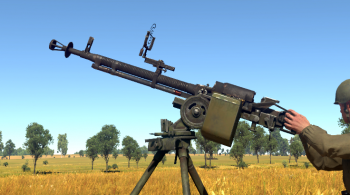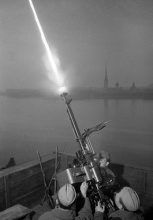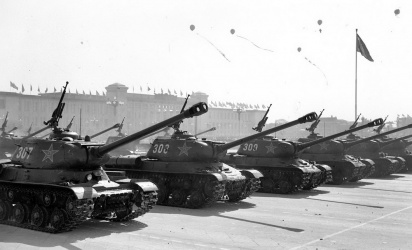Difference between revisions of "DShK (12.7 mm)"
Inceptor57 (talk | contribs) m (→History) |
Inceptor57 (talk | contribs) m (→External links) |
||
| Line 100: | Line 100: | ||
;Bibliography: | ;Bibliography: | ||
| − | * DiGiulian, Tony | + | * DiGiulian, Tony and Vladimir Yakubov. "12.7 mm (0.5") Degtjarev DShK M38 Heavy Machine Gun." ''NavWeaps'', 06 Feb. 2017, [http://www.navweaps.com/Weapons/WNRussian_12.7mm-79_DShK.php Website]. Accessed on 05 Aug. 2021 ([https://web.archive.org/web/20210805161136/http://www.navweaps.com/Weapons/WNRussian_12.7mm-79_DShK.php Archive]). |
| − | * Koll, Christian | + | * Koll, Christian. ''Soviet Cannon: A Comprehensive Study of Soviet Guns and Ammunition in Calibres 12.7mm to 57mm''. Self-published, PDF, 2009. |
| − | * Popenker, Maxim | + | * Popenker, Maxim. "DShK DShKM 12.7." ''Modern Firearms'', [https://modernfirearms.net/en/machineguns/russia-machineguns/dshk-i-dshkm-12-7-eng/ Website]. Accessed 05 Aug. 2021 ([https://web.archive.org/web/20210805154342/https://modernfirearms.net/en/machineguns/russia-machineguns/dshk-i-dshkm-12-7-eng/ Archive]). |
| − | * Small Arms Survey | + | * Small Arms Survey. "Weapons Identification Sheet - DShK (& close derivatives)." ''Small Arms Survey'', [http://www.smallarmssurvey.org/fileadmin/docs/Weapons_and_Markets/Tools/Weapons_ID_DB/SAS_weapons-heavy-machine-guns-DShK.pdf PDF]. Accessed 05 Aug. 2021 (). |
{{USSR anti-aircraft guns}} | {{USSR anti-aircraft guns}} | ||
Revision as of 16:53, 5 August 2021
Contents
Description
The DShK machine gun or Дегтярёва-Шпагина Крупнокалиберный (Russian: Degtyaryova-Shpagina Krupnokaliberny; English: Degtyaryov-Shpagin Large-Calibre) is an improved version of the DK (12.7 mm). Georgi Shpagin improved the cartridge feeding mechanism on the large calibre machine gun originally designed by Vasily Degtyaryov.
Vehicles equipped with this weapon
| Vehicles equipped with this weapon | |
|---|---|
| Ground vehicles | |
| Light tanks | Type 62 · ▂Type 62 |
| Medium tanks | T-44-100 · T-54 (1947) · T-54 (1949) · T-54 (1951) · T-55AM-1 · T-55A · T-62M-1 |
| Т-34-85 Gai · Type 59 · ZTZ59D1 · Type 69 · T-69 II G | |
| Heavy tanks | IS-2 (1944) · ␗IS-2 (1944) · IS-3 · IS-4M · IS-6 · T-10A |
| Tank destroyers | ISU-122 · ␗ISU-122 · ISU-122S · ISU-152 · ␗ISU-152 |
| SPAA | GAZ-AAA (DShK) |
| Naval vessels | |
| Motor gun boats | TKA-412 · MO-4 · OD-200 · Ya-5M |
| Motor torpedo boats | D-3 · G-5 · Pr.123-bis |
| Gunboats | Groza |
| Armoured gun boats | BMO · MBK-161 early · MBK-161 late · MBK pr.186 · MBK pr.186 (MK 85) · Pr.191 · Pr.1124 early · Pr.1124 late · Pr.1124 MLRS |
| Sub-chasers | MPK-163 · MPK Pr.122bis · MPK pr.122A |
| Destroyers | Frunze · Leningrad · Moskva · Soobrazitelny · Stroyny · Ognevoy · Tashkent |
| Light cruisers | Kirov · Krasny Kavkaz · Krasny Krym · Maxim Gorky · Voroshilov |
General info
Tell us about the tactical and technical characteristics of the cannon or machine gun.
Available ammunition
Describe the shells that are available for the weapon and their features and purpose. If it concerns autocannons or machine guns, write about different ammo belts and what is inside (which types of shells).
Comparison with analogues
Give a comparative description of cannons/machine guns that have firepower equal to this weapon.
Usage in battles
Describe the cannon/machine gun in the game - its distinctive features, tactics of usage against notable opponents. Please don't write a "guide" - do not impose a single point of view, but give the reader food for thought.
Pros and cons
Pros:
- Decent rate of fire
- Quick traverse speed for an top-mounted machine gun
- Penetration is very similar to the M2 Browning, can take on many lightly armoured vehicles or SPAA
Cons:
- Low ammo count, will quickly run out if not properly managed
History
The Soviet Union's search for a suitable heavy machine gun for anti-armour and anti-aircraft purposes led to V.A. Degtyaryov developing the DK, or Degtyaryov Krupnokalibernyj (Degtyarov Large Caliber), in 1930 chambered in the new Soviet 12.7x108 mm cartridge. However, the initial design was hampered by its 30-round magazine capacity, restricting its capability to act as a machine gun. As such, the DK was discontinued by 1935. In 1937, another designer named Georgiy Shpagin developed a belt feed mechanism for the DK, which was fed from the left side only by a fixed, non-disintegrating metal belt for up to 50 rounds. By 1938, the weapon was submitted for firing trials and passed, with the weapon adopted in 1939 as the DShK mod. 1938. (DShK: Degtyarov – Shpagin Krupnokalibernyj, or "Degtyarov & Shpagin Large Caliber")[1][2]
The DShK served primarily as an emplaced heavy machine gun weapon, with special sights produced for anti-aircraft roles. The DShK was mounted on the Koleshnikov universal mount, which had a carriage allowing a wheeled configuration for transportation and firing at ground targets, or a tripod configuration using the carriage trails. In 1943, the DShK saw its first tank mount as the DShKT on top of the IS-2. The other prominent user of the DShK was the Soviet Navy, which used the DShK in a single (DShK, MTU-2), twin (DShKM-2, MSTU, DShKM-2B, 2-UK, 2M-1), or quadruple mount (DShKM-4) on torpedo boats, patrol boats, and destroyers.[1][3]
Production figures for the DShK was low prior to the Soviet's involvement of World War II. Pre-war figures have the DShK only begin delivering in 1940, making up a small part of the total 2,000 large caliber machine guns in the Soviet Union's overall inventory (with 830 single-barrel DShK mountings in the Soviet Navy). In the beginning of 1042, the Red Army's inventory had only 720 DShKs. However, as the weapon's value and production ramps up, the Red Army had 5,218 DShKs in 1943, and then 8,442 DShK machine guns in 1944. The Soviet Navy received 5,164 DShKs throughout the war.[1]
After World War II, the DShK saw another improvement by designers K.I. Sokolov and Aleksandr Norov. The improvement took elements from the RP-46, with a new feed mechanism that allowed the loading of belts from the left or right side of the machine gun. The weapon was also simplified with the implementation of stamped sheet steel parts, design of a new belt that disintegrated in 10-round increment, and other improvements that improved reliability and reduced failure rate of the weapon. This modernized design accepted in 1946 as the DShKM 1938/46.[1] The DShKM is distinctive from the DShK with its flatter belt-feed unit on the receiver.
The DShK and its variants have seen widespread use beyond the Soviet Union, either as aid to allies or sold through the arms market.[2] Multiple license-produced variants and copies are produced of the weapon, such as the Chinese Type 54 and the Iranian MGD 12.7.[4]
Media
See also
- DK (12.7 mm) - Preceding variant of the machine gun
External links
- References
- Bibliography
- DiGiulian, Tony and Vladimir Yakubov. "12.7 mm (0.5") Degtjarev DShK M38 Heavy Machine Gun." NavWeaps, 06 Feb. 2017, Website. Accessed on 05 Aug. 2021 (Archive).
- Koll, Christian. Soviet Cannon: A Comprehensive Study of Soviet Guns and Ammunition in Calibres 12.7mm to 57mm. Self-published, PDF, 2009.
- Popenker, Maxim. "DShK DShKM 12.7." Modern Firearms, Website. Accessed 05 Aug. 2021 (Archive).
- Small Arms Survey. "Weapons Identification Sheet - DShK (& close derivatives)." Small Arms Survey, PDF. Accessed 05 Aug. 2021 ().
| USSR anti-aircraft guns | |
|---|---|
| 7.62 mm | Maxim's |
| 12.7 mm | DShK |
| 14.5 mm | KPVT |
| 23 mm | AZP-23 · ZU-23 |
| 25 mm | 72-K |
| 30 mm | 2A38 · ZK453 |
| 37 mm | 2A11 · 61-K · Sh-37 · Type 65 |
| 57 mm | S-68 |
| Tank machine guns | |
|---|---|
| USA | |
| 7.62 mm | M37 · M60D · M73 · M240 · M1919A4 · Mk.52 |
| 12.7 mm | FN M3P · M2HB · M80 · M85 |
| Germany | |
| 5.56 mm | MG4 |
| 7.62 mm | C6 · MG3A1 |
| 7.92 mm | MG13 Dreyse · MG34 · MG37(t) · MG42 |
| 12.7 mm | S.MG.50 |
| USSR | |
| 7.62 mm | DT · PKMB · PKT · PKTM · RP-46 · SGMT |
| 12.7 mm | DK · DShK · 6P49 · NSVT |
| 14.5 mm | KPVT |
| Britain | |
| 7.62 mm | Browning MG4 · L3A1 · L8A1 · L8A2 · L37A1 · L37A2 · L94A1 |
| 7.7 mm | Vickers |
| 7.92 mm | BESA |
| 12.7 mm | L21A1 |
| Japan | |
| 6.5 mm | Type 91 |
| 7.62 mm | Type 74 |
| 7.7 mm | Type 97 |
| 12.7 mm | Type 60 (B) |
| China | |
| 5.8 mm | QJT |
| 7.62 mm | Type 55 · Type 59 · Type 86 |
| 12.7 mm | QJC88A · Type 54 |
| 14.5 mm | QJG02 |
| Italy | |
| 7.62 mm | Beretta MG42/59 · FN MAG 60-40 |
| 8 mm | 34/40M · Breda Mod. 38 |
| 13.2 mm | Breda Model 31 |
| France | |
| 7.5 mm | AAT-52 · MAC 31 |
| 7.62 mm | A-A-F1N |
| 8 mm | Hotchkiss Mle 1914 |
| Sweden | |
| 6.5 mm | ksp m/14-29 |
| 7.62 mm | ksp 39 C · ksp 58 · ksp 94 |
| 8 mm | ksp m/36 · ksp m/39B |
| 12.7 mm | ksp 88 |
| Naval machine guns | |
|---|---|
| USA | |
| 7.62 mm | M73 |
| 12.7 mm | AN-M2 |
| Germany | |
| 7.62 mm | MG-3 |
| 7.92 mm | MG08 pattern 1908 · MG15 · MG34 |
| 13.2 mm | Hotchkiss |
| 15 mm | MG M38(t) |
| USSR | |
| 7.62 mm | Maxim |
| 12.7 mm | DShK |
| 14.5 mm | KPV |
| Britain | |
| 7.62 mm | FN MAG |
| 7.7 mm | Lewis 1916 · Vickers GO No.5 |
| 12.7 mm | Vickers Mk.V |
| Japan | |
| 6.5 mm | Maxim · Type 38 pattern 1907 |
| 7.7 mm | Type 89 · Type 92 |
| 13.2 mm | Type 93 |
| Italy | |
| 6.5 mm | Breda Mod.30 · Fiat Model 26 |
| 12.7 mm | Breda-SAFAT |
| 13.2 mm | Breda Model 31 |
| France | |
| 7.7 mm | Darne M1922 |
| 7.92 mm | Hotchkiss pattern 1914 |
| 13.2 mm | Browning · Model 1929 Hotchkiss |






